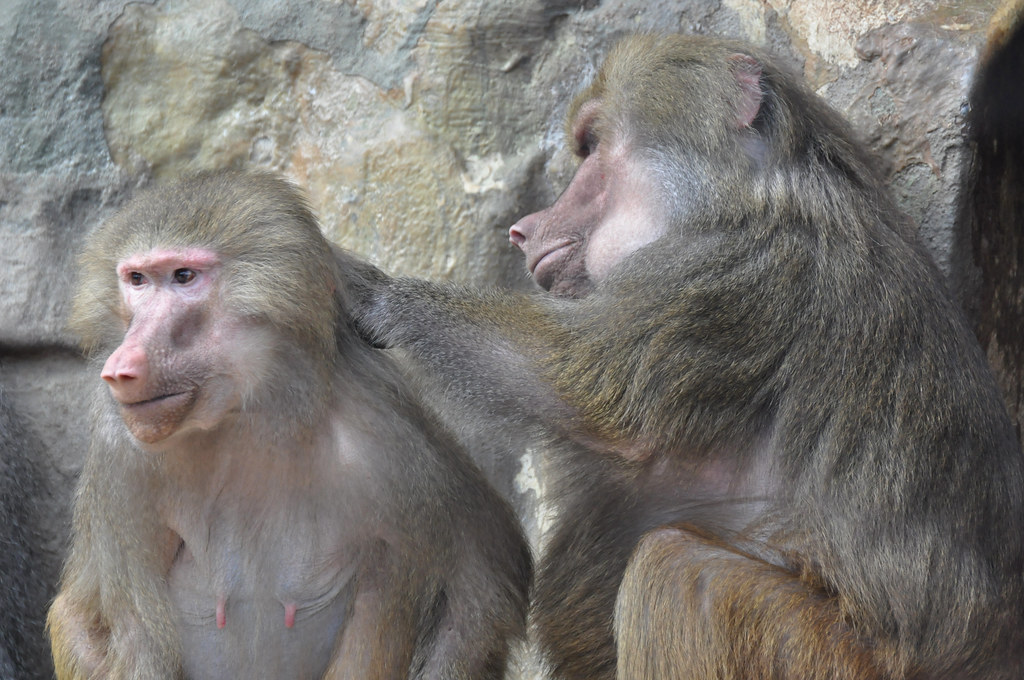.

Hamadryas Baboons (Papio hamadryas), Brooklyn Prospect Park Zoo: photo by Wally Gobetz, 28 April 2007
Adam
got into the carriage with the Younger Set. They still looked a bit
queer, but they cheered up wonderfully when they heard about Miss
Runcible's outrageous treatment at the hands of the Customs officers.
"Well," they said. "Well!
how too, too shaming, Agatha darling," they said. "How devastating, how
unpoliceman-like, how goat-like, how sick-making, how too, too awful."
And then they began talking about Archie Schwert's party that night.
"Who's Archie Schwert?" asked Adam.
"Oh, he's someone new since you went away. The most bogus man. Miles discovered him, and since then he's been climbing and climbing and climbing,
my dear, till he hardly knows us. He's rather sweet really, only too
terribly common, poor darling. He lives at the Ritz, and I think that's
rather grand, don't you?"
"Is he giving his party there?"
"My
dear, of course not. In Edward Throbbing's house. He's Miles'
brother, you know, only he's frightfully dim and political, and doesn't
know anybody. He got ill and went to Kenya or somewhere and left his
perfectly sheepish house in Hertford Street, so we've all gone to live
there. You'd better come, too. The caretakers didn't like it a bit at
first, but we gave them drinks and things, and now they're simply
thrilled to the marrow about it and spend all their time cutting out
'bits', my dear, from the papers about our goings on.
"One awful thing is we haven't got a car. Miles broke it, Edward's I mean, and we simply can't afford to get it mended, so I think we shall have to move soon. Everything's getting rather broken up, too, and dirty, if you know what I mean. Because, you see, there aren't any servants only the butler and his wife and they are always tight now. So demoralizing. Mary Mouse has been a perfect angel, and sent us great hampers of caviare and things.... She's paying for Archie's party tonight, of course."
"Do you know, I rather think I'm going to be sick again?"
"Oh, Miles!"
Evelyn Waugh (1903-1966): from Vile Bodies (1930)
Adult male Hamadryas Baboon (Papio hamadryas) with his troop, Cologne Zoo: photo by BS Thurner Hof, 2005
Hamadryas Baboons (Papio hamadryas), Madrid Zoo: photo by Manuel González Olaechea y Franco, 2007

Hamadryas Baboons (Papio hamadryas), Brooklyn Prospect Park Zoo: photo by Wally Gobetz, 28 April 2007

Hamadryas Baboons (Papio hamadryas): photo by davidbuttle, 16 October 2011

Hamadryas Baboons (Papio hamadryas): photo by davidbuttle, 16 October 2011

Hamadryas Baboons (Papio hamadryas): photo by davidbuttle, 16 October 2011

Hamadryas Baboon (Papio hamadryas): photo by davidbuttle, 16 October 2011

Hamadryas Baboons (Papio hamadryas), Singapore Zoo: photo by Li3, 18 January 2010

Hamadryas Baboon (Papio hamadryas), male, Singapore Zoo: photo by Li3, 18 January 2010

Hamadryas Baboons (Papio hamadryas), Antwerp Zoo: photo by Truus and Zoo, 27 March 2010
Saturday 24 May 1930
Worked in the morning. Went to tea with Edith Sitwell. Stale buns and no chairs. Numerous works by Tchelitchew in wire and wax. Harold [Acton] there. Diana [Guinness, née Mitford] in a hat of the grossest eccentricity. Edith talked only of poetry. Home to change, then to 500 Club to meet Anthony Bradley who took me to dinner with a beastly woman called Lady Jean Mackintosh [daughter of the 13th Duke of Hamilton]. From there to a dance by Mrs Gurling. No one I knew. Eventually I talked to a young man who turned out to be Jim Laurence. He stole a car and drove me home.
from The Diaries of Evelyn Waugh, edited by Michael Davie (1976)

Hamadryas Baboon (Papio hamadryas), Kölner Zoo, Cologne: photo by Truus and Zoo, 12 August 2010


"Looking back on the literary groupings of the 1930s, Julian Maclaren-Ross identified a style of fiction that he called the 'party novel', its subject matter marked down as 'the day-to-day doings of a "bohemian" group much preoccupied with their love affairs and the impact of their personalities upon each other'. All this makes the Bright Young Person novel sound like a sociological offshoot, and indeed, one of the most irritating things about the genre is its cliqueishness, the vague sense -- discernible almost from one book to the next -- that everybody knows everybody else and the world beyond is simply a joke in rather bad taste... The practical consequence [of multiple personal associations within the group] was a reliance on the private joke, intelligible only to a tiny coterie audience... Sometimes, the joke can involve a single person. The inspired use made of the adjective 'sheepish' in Vile Bodies (as in 'a perfectly sheepish house') stems from the promise made by Waugh to the 12-year-old Jessica Mitford that he would somehow include her pet lamb in the text."
ReplyDelete-- from DJ Taylor: The beautiful and the damned (The Guardian, 28 September 2007)
I've just finished Vile Bodies. Very funny, though no getting past that sense that this was a book written for friends. And I wasn't going to be one of them if you dropped me into that world.
ReplyDeleteHenry Green's Party Going makes an interesting comparison. He catches the anxieties, the feeling that at any time the game might no longer make sense.
I enjoyed this post enormously. And to share a private, obscure and somewhat unkind joke (about me, unfortunately, and having to do with pictures of simians and Evelyn Waugh), my mother would have really enjoyed it also. (I wish she were around to see and read it.) Julian Maclaren-Ross was really, really sharp in so many ways. I really imagined they would have made a movie about his disordered life by now. I like DJ Taylor's Firbank description: "a wit so delicate that it can scarcely be identified ....the whole invariably undercut with intimations of deep unease, often extending to outright tragedy." I don't know whether you're familiar with Marie Jacqueline Lancaster's book, "Brian Howard, Portrait of A Failure." It's terrific, but obviously very sad. Curtis
ReplyDeleteYes, the breathlessness, brink-of-hysteria delirium, loss of equilibrium, sense of apprehension upon the "slipp'ry top", conveyed in Green (much of it in the giddy running-on of the sentences), feels like a reflection of a scene experienced from within, while Waugh's brilliant, brittle sentences seem to skate uneasily across the surface of that scene, avoiding the vertiginous descent to the interior.
ReplyDeletePerhaps it's that Green was born into and never particularly wished to escape from those classes to which Waugh always aspired, his nose pressed to the glass from outside as it were, in that complication of love/hate/ resentment/unconscious subscription.
Curtis, we crossed in the aether, there. About that Brian Howard bio, the title's a bit... hard. But I see that the biographer believes BH would have "endorsed" it.
ReplyDeleteBurnt Out Bright Young Things
"His foolhardy plan to interview Hitler in 1932 was foiled only when he had a tiff with Unity Mitford ('Just for that, Brian, I won't introduce you to the Fuehrer')."
Thank you for posting the link to the review of the Brian Howard biography. Many of his poems do seem like "period pieces," but some of them are (including a couple published in Horizon, as I recall) are memorable and moving. Marie Jacqueline Lancaster, I found out, also has an interesting story, which is recounted in a neat book published a couple of years ago called The West End Front (about London hotel life during WW II) and in the memoirs of the publisher Anthony Blond called Jew Made In England. Curtis
ReplyDelete